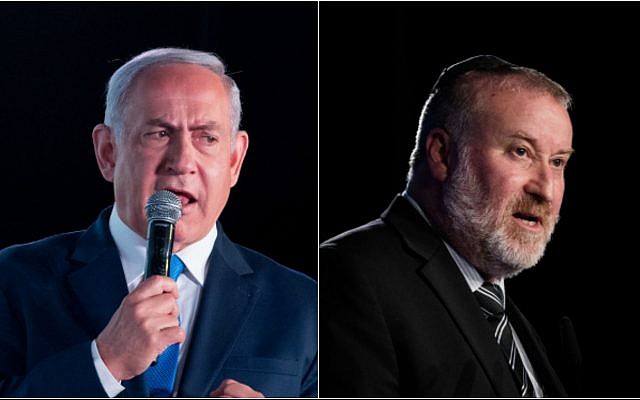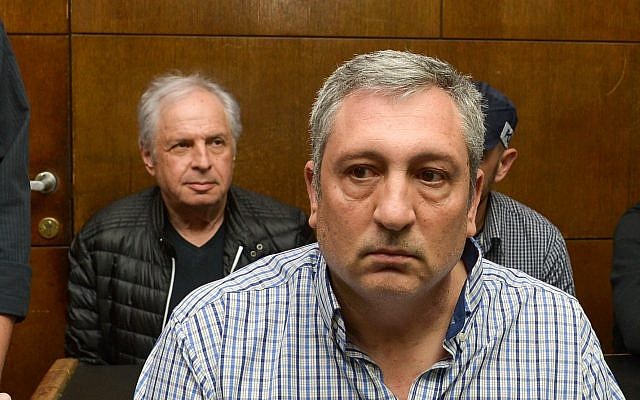Defending PM, Amir Ohana had claimed police extorted state’s witness Nir Hefetz with extramarital affair; Hefetz slams minister, vows ‘shameful’ accusation ‘will not go unanswered’
By RAOUL WOOTLIFF, TOI and TOI STAFF6 November 2019, 8:48 pm

Attorney General Avichai Mandelblit (L) and Justice Minister Amir Ohana attend the annual Justice conference in Airport City, outside Tel Aviv on September 3, 2019. (Tomer Neuberg/Flash90)
Attorney General Avichai Mandelblit issued an unprecedented rebuke of a serving justice minister on Wednesday, saying Amir Ohana’s claim that investigators in Prime Minister Benjamin Netanyahu’s corruption probes extorted a key witness was an attempt to “mislead the public” for the Likud leader’s political benefit.
Mandelblit, in a joint statement with State Prosecutor Shai Nitzan, vowed not to get dragged into litigating Netanyahu’s corruption investigation in public, as the premier’s political allies were trying to force him to do.
The comments highlight the growing animosity between Netanyahu’s Likud and the state prosecution over the investigations into three corruption cases against the prime minister. Netanyahu denies any wrongdoing in the cases and alleges a conspiracy by his opponents in the police, state prosecution and the media.
Mandelblit, who served as Netanyahu’s cabinet secretary and was appointed by him to the attorney general post in 2016, is widely believed to be planning to formally indict the prime minister on corruption charges in the coming weeks.
Mandelblit’s comments come after Justice Minister Ohana earlier on Wednesday took to the podium in the Knesset plenum to accuse police investigators of pressuring a key suspect in one of the criminal cases against Netanyahu.

Apparently breaking a court-imposed gag order, Ohana alleged that police had threatened Nir Hefetz, a former Netanyahu confidant, to turn state’s witness in the Case 4000 probe with hints they had evidence he had an extramarital affair.
Ohana’s comments were met with immediate condemnation by opposition lawmakers. Responding to the public furor caused by Ohana’s statements, Netanyahu issued a laconic defense of court gag orders that also reiterated the extortion claim.
“Though the case of the extortion of state’s witness Nir Hefetz is extremely serious and should worry every citizen, a court-imposed gag order should be respected,” the prime minister said.
Hefetz lashed Ohana on Wednesday, calling his claims “shameful and disgraceful” in a statement delivered by his attorney Ilan Sofer.
“It’s shameful and disgraceful for a justice minister to run roughshod over the law and scorn an explicit gag order by the courts, from the Knesset podium,” Sofer said.
He called the Likud minister’s comments “a shameful attempt to score political points while seriously harming [Hefetz’s] privacy,” vowing Ohana’s actions “will not go unanswered.”
Channel 12 also quoted a source “close to Hefetz” on Wednesday evening insisting there was “no connection” between police questioning and Hefetz’s decision to turn state’s witness.

Vague claims about the investigators’ conduct were first reported Tuesday by Channel 12 television news, but details could not be reported by the outlet due to a court-imposed gag order on the case.
Those details became permissible for reporting when Ohana made his comments in the Knesset Wednesday, as Israel’s Basic Laws stipulate that all Knesset plenum debates must be open to the public and their content permitted for publication.
Ohana described how investigators called in for questioning a woman who was not directly connected to Case 4000, asked her “invasive and intrusive” questions about her relationship with Hefetz, then engineered an “accidental” meeting between the woman and Hefetz in the hallway.
When the two met, investigators allegedly told Hefetz, according to Ohana, that “we know everything and will drop a bomb on your family.”
Ohana continued: “Then Nir surrendered, signed a state’s witness agreement and gave police his version,” Ohana said.

Ohana went on to accuse police investigators of tampering with the new witness’s testimony.
Hefetz’s initial testimony “was checked and found to be false. He admits that, remembers and gives another version [in the questioning room] that is also found to be false,” Ohana claimed.
Attributing his information only to “various reports,” Ohana then claimed the forgetful Hefetz was then taken out of the investigation room for an unknown period of time, had an undocumented discussion with one of the investigators, “and then came back and gave an accurate version, tailored and fitting, detail to detail, with the information the investigators already had.”
Mandelblit responded to the claims in a Thursday statement co-signed by Nitzan, saying he “utterly rejects” the accusations.
Ohana “claimed that serious crimes are being committed with malice aforethought [by investigators], and that the heads of the legal system are ‘defending the criminals’ and ‘allowing the rot to take over,’” the statement notes, quoting the justice minister.

“These extremely serious claims distort reality…. They are part of a series of partisan and incomplete reports in recent days meant to mislead the public. They misrepresent the facts and the chronology of events in the course of the investigation,” Mandelblit and Nitzan’s statement charged.
The attorney general and state prosecutor went on to link the reports to Netanyahu himself, saying the claims “were included in the detailed arguments submitted by the prime minister’s attorneys during the [indictment] hearings [in early October].”
The statement added: “We are now seeing various claims from these defense arguments being made public on a daily basis, with the clear knowledge that the prosecution is unable to respond to these cherry-picked claims.”
Netanyahu had asked “to change the rules and hold a ‘public hearing’” on his indictments, the statement noted, a request that was turned down in September. “Now we are witnessing that very thing, an inappropriate and illegitimate attempt to hold the hearing in the media, against the rules that apply to every other case.”
Mandelblit and Nitzan vowed the pre-indictment process for Netanyahu “will take place in the deliberation rooms only,” and promised they would be “comprehensive and in-depth, with careful consideration of all the defense attorneys’ claims presented in the hearings, including those connected to the interrogation of state’s witnesses.”

The justice minister defended his speech several times on Wednesday, at first insisting incorrectly that everything he had said had already been published in the media, then saying he was unaware of the scope of the gag order.
“I am referring only to what has already been published, as though in the age of Facebook and Twitter there is any meaning to a gag order,” he said initially.
A later statement from his office insisted that “the minister only repeated things that have already been published, and not anything new, because he doesn’t have any new information from the investigation’s materials, which have not been handed to him.”

Later still, he said in a tweet: “I don’t know what details are forbidden for publication, because I don’t have the gag order — I’m not a media outlet. The sections of the investigation materials forbidden for publication also aren’t available to me — I’m not an investigative body.”
Meretz MK Tamar Zandberg slammed Ohana, saying his pretense of defending the rights of suspects like Netanyahu was undermined by his willingness to hurt the other witnesses in full public view.
“The justice minister chose to break a gag order and revealed private details under the guise of protecting the rights of those under investigation, and he didn’t even see the irony in it,” she tweeted, adding, “The cat is out of the bag: The rights of suspects and all other legal authorities are only interesting when they serve his master Netanyahu.”
Hefetz is a former Netanyahu spokesman and confidant and a witness in Case 4000 — the most severe of the cases facing the premier — in which Netanyahu is suspected of pushing regulatory decisions benefiting the controlling shareholder of the Bezeq telecommunications group, Shaul Elovitch, in return for ongoing positive news coverage.

Hefetz turned state’s witness after being arrested and questioned over a two-week period, and is believed to have provided prosecutors with key information about the period when he served as an informal interlocutor between Netanyahu and Elovitch.
Channel 12 news on Monday shared other transcripts of statements Hefetz gave, in which he spoke of trouble accurately remembering details of the case, changed his testimony on several occasions and mentioned meetings that apparently did not take place.
On Tuesday, Mandelblit vowed to look into possible wrongdoing by investigators. The head of the Israel Bar Association also called for an immediate and open inquiry into the accusations.
Mandelblit said in a statement Tuesday that “if it is found that illegitimate actions were carried out in the handling of the cases, the issue will be reviewed and dealt with accordingly.”

On Friday, both channels 12 and 13 reported that Mandelblit would be holding discussions this week with the aim of reaching a decision by the end of November on whether to file charges against Netanyahu in the graft probes.
In a draft charge sheet issued in February, Mandelblit outlined charges of bribery, fraud and breach of trust against the premier in Case 4000, and fraud and breach of trust in two other cases, dubbed by police Case 1000 and Case 2000.
Netanyahu, who denies any wrongdoing, has repeatedly claimed that he is the victim of a witch hunt by the media, the left, police and the state prosecution designed to oust him from power.



If Hefetz worked in Netanyahu’s office and was to be conversant with state secrets…to a degree…then would he not have had to sign a solemn oath of confidentiality, which would supersede any attempt to break it. To do so might possibly be some sort of treason…I’m not familiar with the PM’s Office regulations, not yet having been elected to that position…but….?
Also the same for Mandelblit….he was deeply involved with govt..confidential matters, which had to have included those of Netanyahu, so he should have recused himself immedictely the Netanyahu matters were broached.
I’d appreciate some clarification on this from a poster who KNOWS…